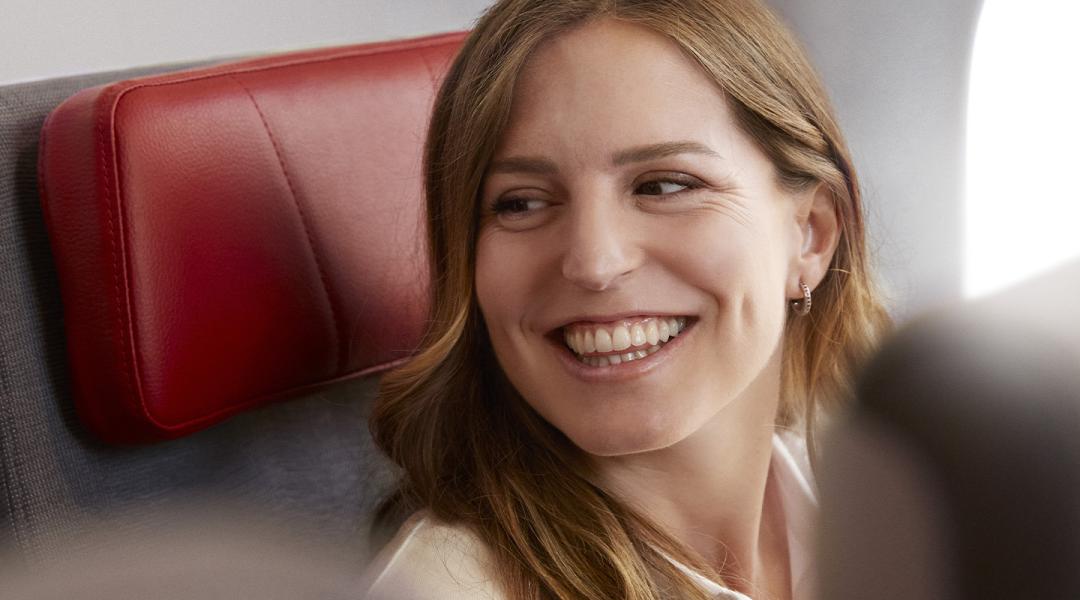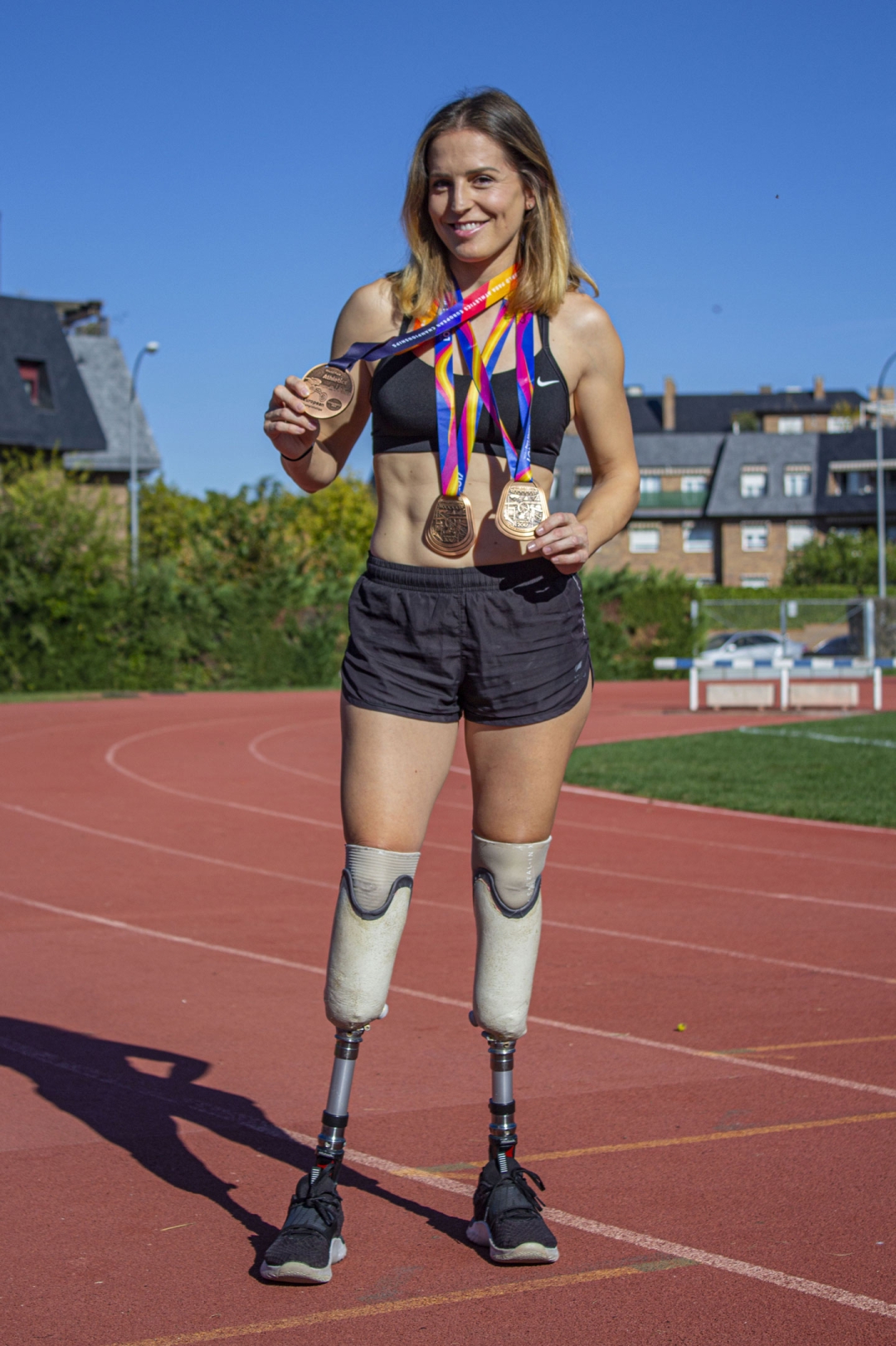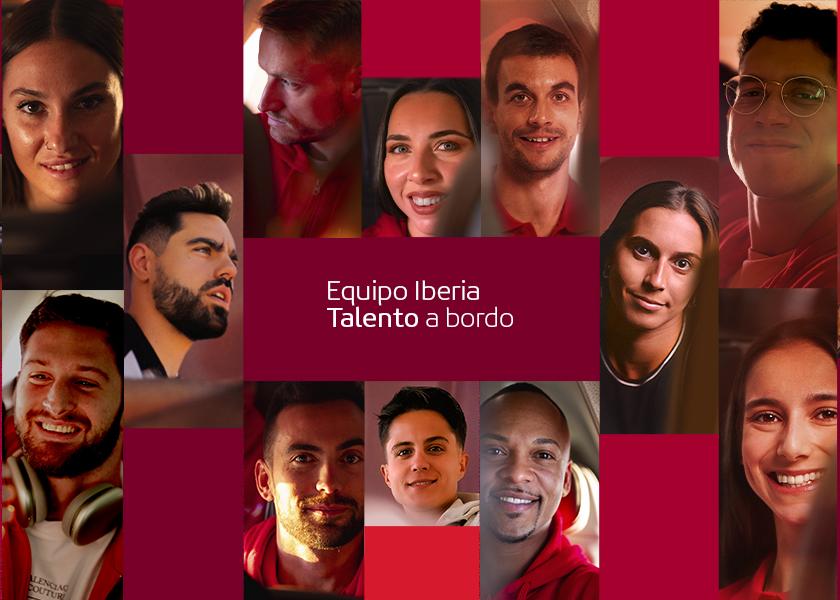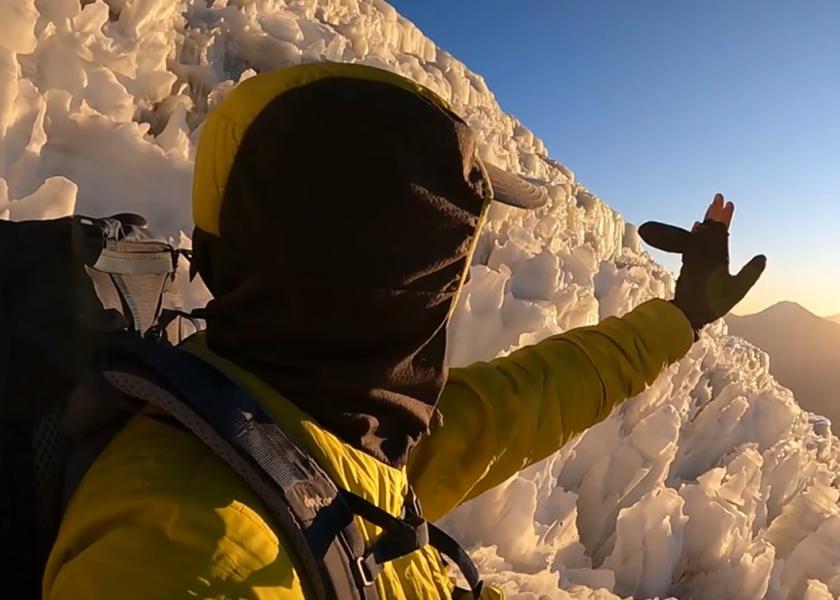Sara Andrés
Joie de vivre

Life has not smiled on Sara Andrés, but she has smiled back at life. Her vitality is contagious. This Paralympic athlete is one of the new recruits to the Iberia Talento a bordo Team. In 2011, after a traffic accident, her reality changed from one day to the next, but with the help of her doctors and support system, she was able to recover physically and mentally, to walk (and run!) again.
Paralympic athlete Sara Andrés (Madrid, 1986) has learnt to live with adversity and come out stronger on the other side. She did so after undergoing a double amputation under the knee after a serious accident at the age of 25. Also, when she was diagnosed with thyroid cancer and basal cell carcinoma [a type of skin cancer]. “Because of everything that’s happened to me, I have tools to face adversity and have learnt to value what I do have instead of what I don’t,” she declares. After her accident, she has not only turned into one of the best Paralympic sprinters in the world—taking part in Rio, Tokyo and Paris, where she was photographed by Annie Leibovitz—, she has also tried her hand at amateur theatre—performing pieces like Heridas, about the women in Lorca’s work—and children’s books—publishing ¿Sabes quién soy? and Juntos mejor—. Talent she has developed through hard work. “Talent can be innate, but you can also work on it. And that’s wonderful because anyone can develop it. Not just people with innate talent can succeed, and that’s really motivating,” she declares. Soon, she’ll face her greatest challenge yet, motherhood, but she’s already dreaming of running in Los Angeles with her little one cheering her on from the stands.
You have a life motto: “I prefer not to have feet and to know where I’m going than to have them and feel lost.” What does that mean to you?
This motto came to me not long after losing my feet and, still today, it helps me overcome the challenges I set myself. When I feel low, it reminds me that having clear goals or knowing the kind of person you want to be is the most important thing. Everything else takes shape around that. Sometimes we have it all, but we feel lost. It’s almost better not to have everything but to have goals that push you forward, that motivate and excite you.
You’ve admitted that after the accident you were in a very dark place. Who helped you out of there?
At the beginning, my psychologists, psychiatrists, doctors… But then, my network of family members and friends that I discovered I had. And lastly, people you don’t expect to appear in your life. In my case, that was Carmen, the woman who took care of me at home and became my second mother. When I started competing, I always had the psychologist who treated me since the beginning by my side and, since Tokyo, the Spanish Paralympic Committee offers a sports psychology service that’s good for me. Manola [Manuela Rodríguez], the psychologist at the high-performance centre, travels with us and is with us during the competition.
“Our capacity to fight and carry on is wonderful, and our desire to live is always there”
Before the accident, you had practised other sports like tennis, karate or equestrianism. Why did you later choose athletics?
At school I did some athletics, but it never caught my attention. After the accident, the first thing I did was learn to walk again, and that’s when I started thinking about doing sports. I set myself the goal of learning to run again, but I needed money to buy the prosthetics, and my friends helped me by organizing crowdfunding. When I got them, I started running, but with the intention of playing another sport… But I didn’t know which. I started enjoying athletics so much I stopped looking for another sport.
You also overcame thyroid cancer and basal cell carcinoma. Are human beings stronger than they believe?
Absolutely. When I tell my story, many people say, “I couldn’t do it.” And you couldn’t under normal circumstances, but when you’re in between life and death, you realize your body and mind are really strong. Our capacity to fight and carry on is wonderful, and our desire to live is always there. I realized the strength and potential I had and gave it a positive spin. Now, every time I face a setback, I think, “It’s bad, and I need to cry and process it, but I’m going to look for the silver lining.” Generally, we focus on the negatives, but you can train your mind to change that mindset so that the positives are more accessible in your head and that’s the first thing you think when something bad happens.

Paralympic sprinter Sara Andrés poses with some of the medals she has won throughout her sporting career. © Emma Portillo - Courtesy of Sara Andrés
You went from hiding your prosthetics to proudly showing them off; what was that process like? What did you notice?
At the beginning I felt embarrassed; I thought people would look at me and judge me… There was also the fear of not fitting in. When I started competing, I gave some interviews, and I thought that the kids I was teaching had to know who I really was. I didn’t want them to find out from TV. One day I told them, and in general, their reactions were really natural and positive. I realized that I was the one who was scared. I decided to no longer hide my prosthetics… If I fancied wearing shorts, I’d wear them! When society sees people with disabilities, it helps them to empathize more with us.
Since the accident, you haven’t stopped; did it somehow push you to live life to the fullest?
Yes, of course. Before the accident, I was 25 and only did what I was supposed to do. I had two degrees and did sport but didn’t have greater ambitions. I was limited, kind of conditioned by what my parents would say. The accident was such a big shock that I understood that life is fleeting and I decided to enjoy it 100%. Something clicked and I started to practice a lot of sport, develop my creativity, take part in projects, and stopped saying no to myself. I give everything a try and, if it works out, great. If not, it doesn’t matter, I enjoy the process.
“The accident was such a big shock that I understood that life is fleeting and I decided to enjoy it 100%. I give everything a try and, if it works out, great. If not, it doesn’t matter”
You’re also part of a theatre company. How has acting helped you?
After the accident, as well as feeling embarrassed, I lacked self-esteem. I signed up for theatre lessons to work on that. I wanted to feel like myself again. When I finished the three-year course at the Las Rozas school, with a group of colleagues we created a theatre association, Youkali Escena, with whom we started putting on plays and performing them across Spain. We’ve even won several awards! It has helped me build my confidence, but also have fun, travel, make friends…
Soon you’re going to face a new challenge: motherhood. How is it going? Have you taken a break from sports?
It’s the challenge of a lifetime, and I’m really happy. Everyone tells me that while the baby is inside, everything is under control, but not afterwards (laughs). This year I’ve been training, but last week [this interview is held on the 11th of July] my doctors told me I should stop running because it could cause a premature birth. I’ve left the athletics tracks, but I’ll carry on swimming while I can. First, because sport equals health and, second, because it will help my recovery after the birth. My idea is to return to competing and set myself goals in Los Angeles.
In Paris, you finished fourth, three tenths of a second from the podium. Do you dream of winning a medal in Los Angeles? Is that what pushes you to carry on?
I dream of a medal in Los Angeles, but above all I dream of enjoying myself because in Tokyo, for example, I became obsessed with it and realized that’s not what matters. Winning one would be wonderful, of course, but even though you compete against others, athletics is a competition against yourself and what you should be proudest of are your improvements. With athletics, feeling that you’re improving is what makes you carry on. I think a lot about going to Los Angeles so that my baby can see me running, fighting and enjoying myself. I hope I feel physically strong and win a medal!


